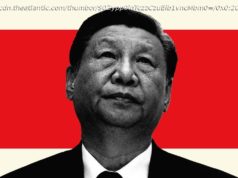Thousands of Hong Kong people braved sweltering heat to protest against Beijing’s tightening grip over the city.
Hong Kong – Thousands of Hong Kong people braved sweltering heat on Sunday to protest against Beijing’s tightening grip over the city as the former British colony marked the 21st anniversary of its return to Chinese rule.
The protestors included elderly people in wheelchairs, couples with sleeping toddlers and young residents, some of whom waved banners saying: “End one party rule; Against the fall of Hong Kong.”
“Now the government is already siding with the Communist Party. Can Hong Kong see any universal suffrage in 20 or 30 year’s time? I don’t think so,” said 13-year-old Joanna Wen, who was accompanied by her father.
Hong Kong is a former British colony that was returned to China in 1997 under a “one country, two systems” formula guaranteeing it a high degree of autonomy and the promise of eventual universal suffrage.
Beijing’s refusal to grant full democracy to Hong Kong triggered massive street protests in 2014 and deepened resentment toward China’s perceived growing encroachment on the territory, where its influence in nearly every facet of life has increased.
Hundreds of police were deployed on Sunday as some demonstrators marched with yellow umbrellas, a symbol of democratic activism in the city.
At a ceremony early on Sunday to mark the handover anniversary, Chief Executive Carrie Lam asserted that the “one, country, two systems” framework remains intact under her watch.
Lam took over as governor of Hong Kong a year ago, pledging at a ceremony attended by Chinese President Xi Jinping to be accountable to both Beijing and Hong Kong.
“Without fear, we correctly deal with our relationship with the central government. And we promote a stronger understanding of the constitution, the Basic Law, and national security in all sectors,” Lam said at a Sunday morning cocktail reception.
Also present at the ceremony were the three former Chief Executives – Tung Chee-wah, Donald Tsang and Leung Chun-ying, as well as mainland officials.
While Hong Kong activists push for greater democracy, the city is being pulled under mainland China’s control, and some Hong Kong residents say the old border that has defined the city’s autonomy is slowly withering away.
Lam faces a test later this year with the opening of two highly symbolic infrastructure projects – a bridge and high-speed rail line linking Hong Kong with mainland China.
The projects are part of a broader Beijing plan dubbed the Greater Bay Area, overseen by Xi, to integrate the city into the Pearl River Delta and improve the flow of people and money between Hong Kong and the mainland.
Veteran pro-democracy barrister Martin Lee said the opening of the bridge and rail line will kick-start Hong Kong’s absorption into the Greater Bay Area.
“That seems to be the plan of Beijing, to have Hong Kong absorbed into this bay area… Hong Kong will no longer be Hong Kong,” Lee said.
Lam was chosen by a largely pro-Beijing committee of some 1 200 people in the city of 7.3 million.
Her approval ratings have dipped since then. A University of Hong Kong survey of 1 000 people put her approval rating at 54.3 percent, down from 61.1 percent a year ago.
Reuters






